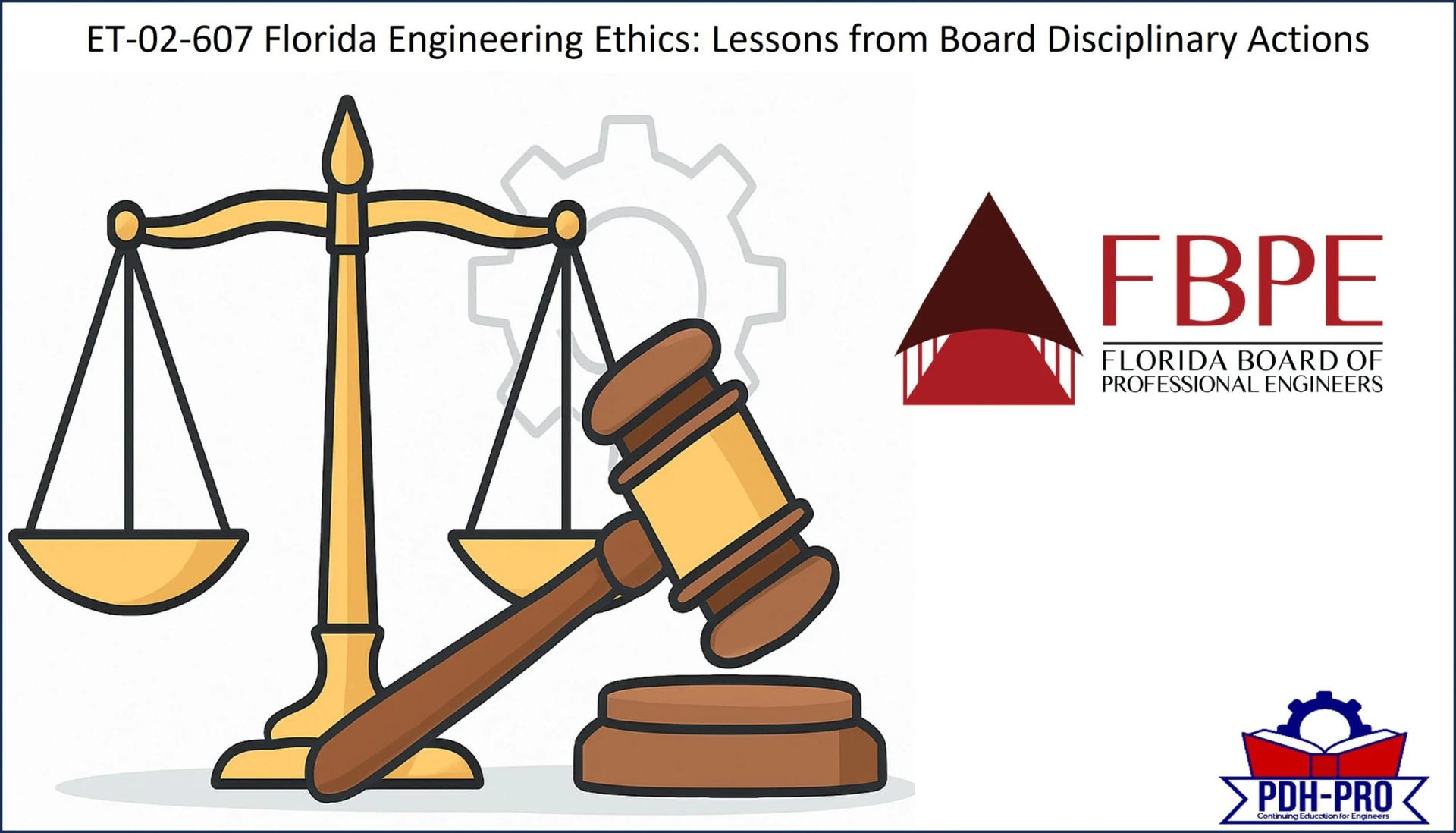Written by: Jordan Ellis, PE
Published: May 2, 2025 | Updated: November 20, 2025
As professional engineers, we spend most of our time focused on technical problems—designing safe structures, evaluating systems, meeting client deadlines. But there’s another side to the job that can’t be ignored: staying in compliance with state board rules. Overlook this part of the profession, even unintentionally, and the consequences can be catastrophic.
As the director of engineering for a national firm, part of my job is to review disciplinary actions from the state boards where we do business. I recently reviewed several rulings from the Florida Board of Professional Engineers that offer a clear look at how engineers can get into trouble—through mistakes, oversights, or poor judgment—and the kinds of penalties the Board hands down.
In this article, I highlight recent disciplinary cases from Florida to show the types of violations that come up most often, the consequences engineers have faced, and what we can learn from them. Whether you’re early in your career or have decades of experience, understanding how the Board interprets its rules—and how easily preventable some of these missteps are—can help you stay in compliance and protect your license.
Related articles:
Select Engineering Ethics in Practice: A 10-Year Review of Disciplinary Actions in New York (2016–2025)
Case Study: A Multi-State Ethics Violation and Its Consequences
Ethics Course for Florida Engineers

This one-hour online course helps Florida Professional Engineers earn guaranteed PDH credit while gaining a clear understanding of their ethical and legal responsibilities under FBPE rules and statutes. Through real disciplinary case studies, participants will learn to identify common violations, navigate the Board’s disciplinary process, and apply practical strategies to maintain compliance and protect their professional license. Ideal for engineers committed to upholding the highest standards of integrity and public safety in Florida.
Overview of Recent Florida PE Board Disciplinary Cases
The Florida Board of Professional Engineers publishes a summary of disciplinary actions every year, and the range of violations is broad—everything from negligence and unlicensed practice to simple continuing education (CE) violations. The recent cases I reviewed involved both individual engineers and engineering firms, and covered projects from residential remodels to large commercial developments.
Florida’s case history aligns closely with the broader enforcement patterns summarized in the central guide to professional engineer disciplinary actions, reflecting recurring issues such as unlicensed practice, documentation errors, and boundary misinterpretations.
Some cases were clear-cut violations, like practicing without a license or misusing a PE seal. Others involved less obvious issues, like incomplete reports or missing documentation. But across the board, the penalties were consistent and serious: fines, suspensions, mandated ethics training, probation, or even permanent revocation in the most egregious situations.
What stood out to me most was how avoidable many of these cases were. Most engineers didn’t set out to break the rules—but they ended up in front of the Board because they cut corners, got complacent, or didn’t respond to Board inquiries.
In the sections below, we’ll explore the most common types of violations, review real cases, and look at how the Board typically responds. Understanding the patterns in these enforcement actions can help you stay one step ahead and avoid missteps that can threaten your livelihood.
Major Categories of Violations
A closer look at the Florida PE Board’s disciplinary actions reveals three major categories that kept showing up. These aren’t obscure or edge-case violations—they’re the kind of mistakes any of us could make if we’re not paying close attention. The Florida Board takes each seriously, and the penalties reflect that.
1. Negligence in the Practice of Engineering
Negligence was the most common violation, and in most cases, it involved engineers signing and sealing plans or reports that were incomplete, incorrect, or failed to meet basic code requirements. I saw examples like:
- Fire protection system designs with obvious safety flaws.
- Structural plans for residential or commercial projects that didn’t meet code.
- Incorrect flood zone certifications.
- Failure to retain required engineering calculations.
Penalties typically imposed:
- $1,000–$5,000 administrative fines.
- Two years of probation.
- Mandatory project reviews at 6 and 18 months.
- Completion of the Florida Laws and Rules Study Guide and an ethics or professionalism course.
- Public reprimands or suspensions.
2. Unlicensed Practice and Misuse of Seals
This category included some of the harshest penalties. A few cases involved individuals practicing engineering without a license at all, but others were licensed engineers who allowed unqualified people to use their seal—or who used the seal of someone else, including in one case, a deceased engineer.
Violations included:
- Forging PE seals and signatures.
- Offering engineering services through a business that wasn’t properly licensed.
- Using another engineer’s credentials to sign and seal documents.
Penalties typically imposed:
- Cease-and-desist orders.
- $5,000–$75,000 fines.
- Permanent bans from reapplying for licensure.
- Public disclosure of violations.
3. Continuing Education (CE) Noncompliance
This one surprised me with how often it came up. Several engineers failed to complete their required CE hours, didn’t respond to audit notices, or tried to renew their licenses without being in full compliance.
Examples included:
- Renewing a PE license without having completed the required CE.
- Failing to respond when the Board asked for proof of compliance.
- Repeated noncompliance despite prior board warnings.
Penalties typically imposed:
- License suspension or reprimand.
- $1,000–$2,000 fines.
- Required completion of CE hours, the Florida Study Guide, and ethics courses.
- Mandatory appearance before the board for reinstatement.
The Board’s rulings tend to follow clear patterns, and once you’ve read through enough of them, you start to see how certain violations result in predictable outcomes. The table below summarizes the most common types of violations, provides real-world examples from recent cases, and outlines the typical penalties imposed by the Florida PE Board.
Table 1: Common Florida PE Board Violations and Typical Penalties
| Violation Type | Examples | Typical Penalties |
| Negligence in Practice | Deficient engineering designs, inadequate supervision, failure to retain calculations | $1,000–$5,000 fine; 2 years probation; ethics course; project reviews; public reprimand |
| Unlicensed Practice / Misuse of Seal | Forging PE seals, practicing without a license, unauthorized business operations | $5,000–$75,000 fine; cease-and-desist order; license revocation or permanent ban |
| Continuing Education Noncompliance | Renewing license without CE credits, ignoring CE audit requests | $1,000–$2,000 fine; license suspension; mandatory ethics and Florida Study Guide; board appearance for reinstatement |
In addition to categorizing violations, it’s helpful to look at the range of penalties the Board actually uses. The table below outlines the most common disciplinary tools the Florida PE Board relies on, with a brief description of the specific penalties imposed. The regulatory themes present in Florida often parallel those shown in what Texas board actions reveal about PE discipline, especially regarding reporting lapses and engineering oversight failures.
Table 2: Rulings and Penalties Issued by the Florida PE Board
| Penalty Type | Description |
| Fines and Costs | Nearly all cases resulted in administrative fines and payment of investigation costs. |
| Reprimands | Formal expressions of disapproval issued in many cases. |
| Probation | Engineers placed on probation, often requiring project reviews at set intervals. |
| Required Coursework | Mandatory completion of engineering professionalism/ethics courses and the Board’s Laws and Rules Study Guide. |
| Suspension | License suspension imposed for failure to meet CE requirements or for repeat offenses. |
| Voluntary Relinquishment | One engineer permanently gave up their license following CE noncompliance charges. |
| Revocation | License revoked in the most severe cases, such as practicing with a restricted license in violation of prior orders. |
| Cease and Desist | Unlicensed individuals or businesses ordered to stop offering engineering services. |
Together, these penalties highlight the Board’s dual focus on accountability and rehabilitation, underscoring the importance of proactive compliance for all Florida engineers.
Florida engineers can also learn from West Virginia PE disciplinary actions from real cases, where enforcement decisions emphasize safeguarding public welfare through strict adherence to state standards.
Emerging Themes and Takeaways
After reviewing the recent cases, a few clear themes stood out. These aren’t just about individual mistakes—they reflect how the Board approaches enforcement and what it expects from licensed engineers. The takeaways below go beyond the specific violations and offer broader lessons that can help you protect your license and stay out of trouble.
Ethics Education Is a Cornerstone of Prevention
Almost every disciplinary order included mandatory completion of an ethics course or the Florida Laws and Rules Study Guide. The Board isn’t just punishing violators—it’s emphasizing education as the best tool to prevent repeat offenses and promote a culture of accountability.
Board Hearings Focus on Accountability, Not Just Punishment
In many cases, engineers were required to appear before the Board to explain what went wrong and outline corrective measures. This underscores that disciplinary actions aren’t just about handing down penalties—they’re about ensuring the engineer understands the seriousness of their actions and is prepared to improve.
Unlicensed Practice Is Treated as a Major Threat
Compared to negligence or CE lapses, unlicensed practice and seal misuse drew some of the harshest penalties—including six-figure fines and permanent bans. This reflects the Board’s prioritization of public protection and the integrity of the licensure system.
Small Projects Are Not Exempt from Big Rules
Many of the cases involved small-scale projects—single-family homes, minor renovations, or limited-scope commercial work. The lesson? Ethical and legal obligations apply no matter the size or complexity of the job.
Early Response Can Make a Difference
Several cases escalated simply because engineers failed to respond to board notices or complaints. Proactive communication and cooperation with the Board can often soften penalties and demonstrate professional responsibility.
Conclusion
Engineering is a technical profession, but it’s also a regulated one—and that means we’re held to high ethical and legal standards. The disciplinary cases reviewed here show just how easy it is to fall short, sometimes through carelessness, sometimes through misunderstanding, and sometimes through poor judgment.
The best way to protect your license isn’t complicated: stay current on your continuing education, treat your seal with care, respond to the Board when they reach out, and take responsibility for the work you sign. The Florida PE Board isn’t out to trip people up—but they will act when an engineer cuts corners or ignores the rules.
For those of us who want to uphold the integrity of the profession, that’s a good thing. These cases are a reminder that competence isn’t just about technical skill—it’s about accountability, ethics, and doing the job the right way every time.
